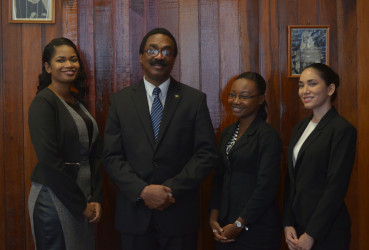All options for legal education in Guyana will continue to be explored as it is time for local students, who have a proven track record of excellence, to stop being second marked, Attorney-General Basil Williams says.
“You have an intake in the school (University of Guyana) about nearly 200 students every year and so we have to have something done in relation to whether we establish our own law school or whether we contribute to the Hugh Wooding Law School (HWLS),” Williams said.
Speaking at a presentation where the best law students for the past four years were presented with books, the AG said the problem of only 25 students being accepted every year into the HWLS in Trinidad needs to be addressed given that the full LLB Degree is being done in Guyana.
The top 25 students from the University of Guyana’s Depart-ment of Law are granted automatic entry to the HWLS each year although in recent years there has been uncertainty over their acceptance.
Williams recalled that Guyana stopped contributing to the Council of Legal Education (CLE), which governs the HWLS, since 2002 and all of the economic costs were transferred to the students. “What has been alluded to is the fact that there are still challenges for legal education in Guyana and even in the region,” he said, while adding that there is a general belief that too many lawyers are coming out every year and many of the countries cannot sustain them.

The AG said while it is generally accepted that countries cannot pay the full contribution to the HWLS or the CLE, they are expected to pay some amount. According to Williams, a lot of countries such as Antigua are exploring the option of building their own law schools. He said that even Jamaica wants to expand since the universities in those countries are churning out a lot of law graduates.
In the case of Guyana, Williams said the late head of the Law Department at UG Sheldon McDonald, was always adamant that the programme had “come of age” since it was producing the best students every year and there was no reason for the students to be second marked.
He said the CLE was to meet in the Bahamas shortly and, “We will have to look at that. There’s a draft agreement between the UG, the University of the West Indies and the Council of Legal Education and so the question will have to be dealt with.”
He added that the only other option being floated is a public-private partnership involving one of the universities operating out of Jamaica establishing a law school in Guyana. Williams had made similar remarks before. In October, he said that building a local law school was not a priority for the current government in the light of “the type of economy” it inherited.
Yesterday, Williams said there will be a presentation which will be taken to cabinet for consideration as there is no choice but to continue to explore the options for legal education in Guyana.
The best students for the past three years, Eleanor Luckhoo, Thandiwe Benn and Narissa Leander were given books. The fourth awardee, Raphael Adjodha was absent. Williams said the reason he decided to resume making the awards, which has not been undertaken for the past four years, is because not much is being done for the law students.
“They don’t get scholarships, the economic cost is not paid by the government and they have to make their way through the programme and the least we can do for the time being is to ensure that there are awards as some indication of encouragement,” he said.




